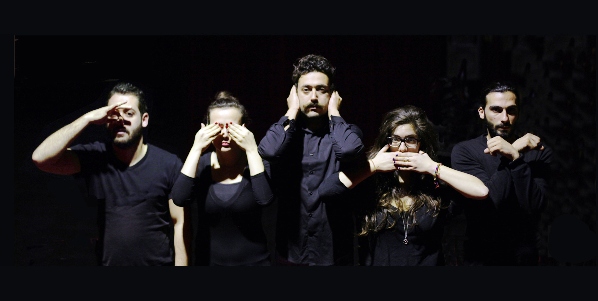
A publicity shot from Lucien Bourjeily’s latest play
Banning a work of art, a book or a play says more about a society and its temperament than anything else. As free speech and readers mark Banned Books Week, Index on Censorship magazine editor Rachael Jolley looks at Lebanon, where the country’s Censorship Bureau has recently flexed its muscles
In the past few weeks, Lebanese playwright Lucien Bourjeily has had his play Will It Pass or Won’t It? banned by his government. Ironically, the play is about censorship, specifically the process in Lebanon whereby plays are passed by the Censorship Bureau of the General Security Office — or not performed.
Bourjeily’s play dramatically challenged that process. But the censors did not see the funny side of his finger poking at a system that involves playwrights putting their words through the wringer of a censorship process, before being squeezed out again.
The censors came up with a variety of reasons why the play should not be shown, ranging from it not being “realistic” (surely missing the point of fiction there), to it not being good enough. Those in charge decided it was not for the people to decide whether it was worthy of their time, it was for them. And with that the play was to be banned.
Banning a work of art, a book or a play says more about the society and its temperament than anything else. Some nations are less than confident about themselves; they are clearly worried that if their ideas are questioned they will be weakened and their power diminished. Ban a book or a play if you worry that by talking an idea or a principle that discussion will somehow harm society. If you don’t worry about your values, principles or laws being discussed since you are perfectly willing and able to defend them, then there is no need for a work of art, book or play to be censored.
A robust, vibrant and creative society is a place where open discussions can take place, and Index on Censorship magazine, throughout its life, has often helped publish some important writings which were censored in other parts of the world, and smuggled out to Index. When the Soviet Union still existed, great thinkers there were censored and silenced, and Index helped their voices to be heard. Today it still seeks to help publish those whose words and ideas are silenced by their own governments. In its winter edition it will publish an extract from Bourjeily’s play so that readers can make up their own minds about whether it is worth performing.
Healthier societies do not hold back debates, even when they may disagree with them. They allow them oxygen to see how worthy of consideration they are. Ideas can shock or offend. Robust societies can cope with that, and even feel healthier for it.
Prodding and debating, as any writer, politician, thinker, inventor or scientist knows, is good for an idea or a thesis; it might be flawed, disproved or ignored. Or not. In the same way that scientists depend on their ideas being tested to see if they work and should be developed, leaders of nations should expect their proposals, their laws or processes to be prodded, debated and discussed. And that is what happens in a book or a play.
In a recent interview, Bourjeily said he felt that the Lebanese were treating their people as children, not allowing them to make their own decisions. Because of that, they were no longer expressing ideas in public, because of the consequences. They are self censoring, they are not exploring. None of that is good for any developing society. Inventors and scientists are attracted to those vibrant centres as are artists and writers. Across the world and throughout history those buzzing hives of thought have led the globe financially and culturally. As ever an open lively society attracts the world’s leading thinkers and creators, a place where censorship and fear is rife does not. Leaders of the world take note.
Rachael Jolley is editor of Index on Censorship, an award-winning magazine, devoted to protecting and promoting free expression. International in outlook, outspoken in comment, Index reports on free expression violations around the world, publishes banned writing and shines a light on vital free expression issues through original, challenging and intelligent commentary and analysis, publishing some of the world`s finest writers.
To mark Banned Books week, Index’s publisher SAGE has freed up access to the full archive of Index on Censorship through 28 Sept. Access articles here: http://ioc.sagepub.com/
This article was originally posted on Sage Connection




